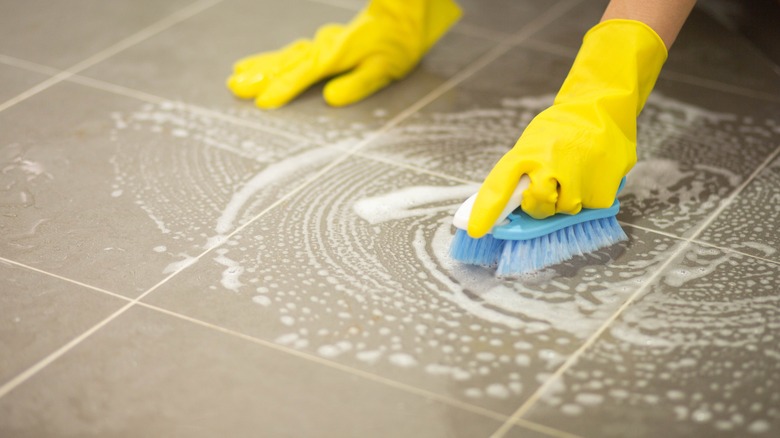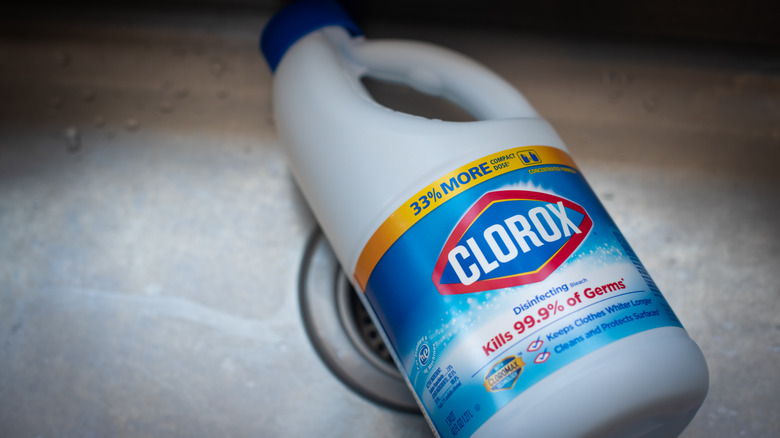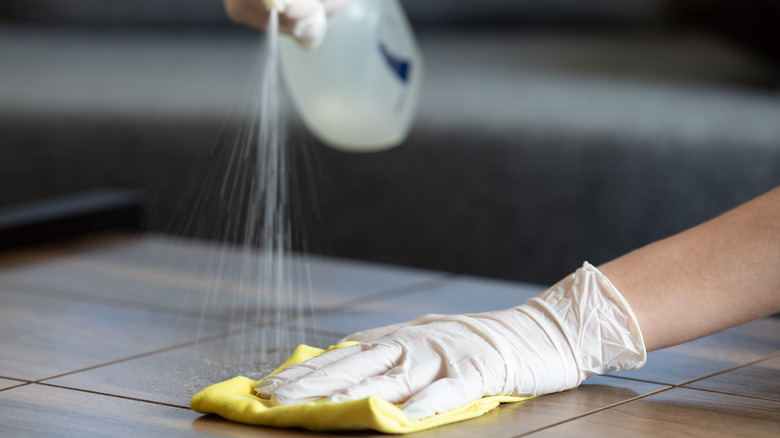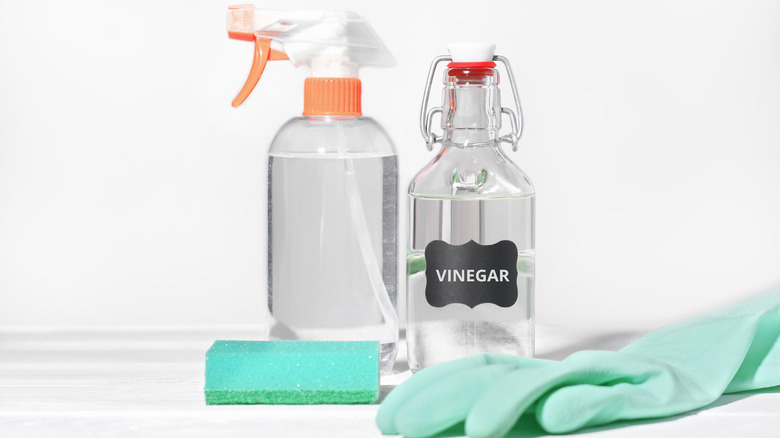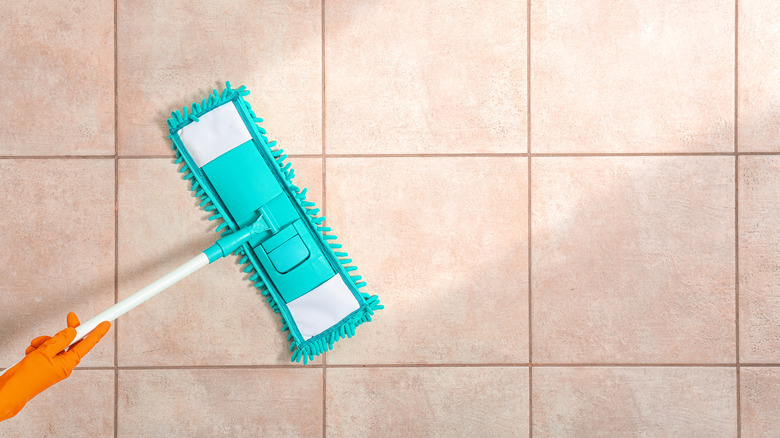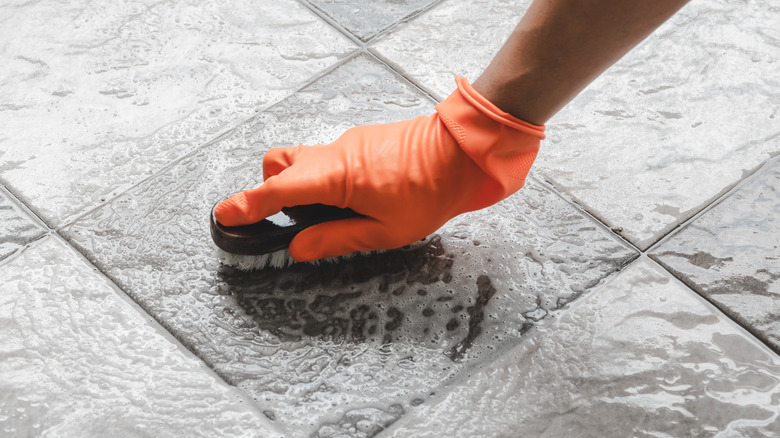Chemicals You Should Avoid Using On Tile Floors
However popular tile flooring may be due to its relatively low maintenance nature, that doesn't mean it doesn't still need a good cleaning every now and then. While it may be tempting to combat dirt, grime, and stains with any household cleaner, it's important to be selective about which ones you use, as the chemicals in some are capable of damaging your floor. Though some tile materials are more durable than others, many are still susceptible to deterioration from chemicals found in common household cleaners. Even if it doesn't damage your tiles, that doesn't mean your sealant and grout are safe.
As a general rule of thumb, it's best to avoid cleaning your tile floors with overly alkaline chemicals, such as bleach and ammonia, as well as overly acidic substances, like vinegar. It's also best to avoid scrubbing your tile floors with gritty, abrasive chemical cleaners and oil or waxed-based ones that can leave behind a sticky, greasy residue.
Bleach
While alkaline chemical cleaners, such as bleach, are often touted as being the perfect go-to cleaner for dirty bathroom tile floors, the reality is that bleach is far too corrosive to trust using it safely. Though CleanTok is full of scrub-happy people making their bathrooms sparkle after dousing them in bleach, be aware that many of these videos and recommendations may be misguided and cause problems far worse than dirty grout and tile. If left on your grout too long, bleach is likely to do exactly what it is known for — brightening and sometimes discoloring the color. Additionally, its corrosive nature can also cause it to eat away at your grout, making its way to your subfloor beneath the tile. If this happens, it can damage your floorboards and subfloor or even potentially cause your tiles to pop out of place, leading to hefty repair costs or a lot of manual labor on your end.
While bleach can certainly make your tile floors look clean by brightening them and leaving them sparkly, in all actuality, bleach itself isn't even actually a cleaning agent, meaning you aren't cleaning your tile when using it. You're just making it look clean by bleaching the pigment of any dirt or stains that may be on the tile.
Ammonia
Similarly to bleach, ammonia is highly alkaline, which can be extremely corrosive on susceptible surfaces such as your grout or particularly delicate tile materials, such as limestone. Using ammonia-based cleaners on your tile floors can dissolve the sealant on the tile and the grout, leading to eventual damage to the tile itself.
While ammonia-based cleaning solutions and chemicals are tough on stains and dirt, they are also tough on the finish of your tile floors. When it sits on the surface of your tile floor or comes into contact with the surface regularly, it can eat away at the glossy sheen of the tile, leaving them looking dull and unspectacular (which is a bummer if you paid top dollar for spectacular-looking tile.) In dulling the shine and finish of your tile floor, ammonia-based cleaners can also leave your tiles looking non-uniform and unmatching, should they cause the color or sheen of one tile to vary from the tile next to it. Not to mention, ammonia-based cleaners are also best avoided if you live with pets, as the first word that often comes to mind when one hears the word "ammonia" is "urine" due to its common association with cat urine. As it turns out, pets, cats especially, are attracted to the smell of ammonia, and using it on your tile floor can also inadvertently encourage them to urinate where they aren't supposed to.
Vinegar
As potentially damaging as it is to use alkaline cleaners on tile floors, it's equally as bad to go in the other direction and use something acidic. Though white vinegar is widely regarded as a safe, natural cleaning option in contrast to many toxic household cleaning products, that doesn't mean it isn't just as harsh on some surfaces. White vinegar is typically a great all-purpose cleaner and disinfectant, but unfortunately, your tile floors can't handle them.
Vinegar's high acidity level allows it to eat away at the sealant of your tile and grout, which makes both the tile and grout susceptible to damage and the buildup of dirt over time. With a pH level of 2, the vinegar can make its way to your tile after easily dissolving the sealant. If left sitting on the surface of your tile for long enough, or if it eats through your floor's sealant without you realizing, the surface of your tile can be destroyed and left looking uneven in color and finish. While certain types of tile, such as ones made of ceramic, are not as easily affected by the acidity in vinegar as other types, such as natural stone, it's still best to avoid using it on your ceramic tile floors to protect the grout.
Oil or wax-based
Oil and wax-based cleaners can leave a slippery, greasy residue on your tile and grout lines, attracting more dirt and grime and making your floors much more challenging to keep clean. In addition to leaving behind a gross, sticky residue that is often hard to clean off your tile floors, oil and wax-based cleaning solutions also run the risk of making your floors incredibly slippery.
Though much of the appeal with these types of cleaners is the fact that they do leave behind a super glossy finish, this typically isn't necessary with tile floors given the fact that most already have a clear sealant on top to give them a glossy finish anyways. Because tile floors are most commonly found in areas of the home like the bathroom, adding oil or wax-based cleaners can be dangerous due to the humid environment, increasing the likelihood of you or a loved one falling and getting injured, per Express Flooring.
Anything abrasive
While abrasive chemical cleaners — containing tiny mineral particles — can work incredibly well at tackling dirt, grime, and other types of stubborn buildup, their notoriously coarse and gritty texture is a common culprit in destroying the clear sealant finish on all types of tile. In fact, these aggressive cleaners are coarse enough to scratch their way all the way through the sealant and easily reach the tile itself, scratching and potentially destroying that as well. While it's not the end of the world or even particularly difficult to replace and repair a simple coat of sealant, replacing the tile itself is another story entirely and has the potential to be very costly, depending on the material.
Abrasive cleaners should only be used as a last resort and only on occasion. To maintain the longevity and beauty of your tile floors, it's best to avoid using them as your regular tile cleaner. As great at cleaning as these abrasives are, they are equally great at removing the sealant on your tile and breaking down its adhesion to the floorboards beneath and the neighboring tiles. As such, this leaves your tiles vulnerable to breaking and moving from their intended place. When your tiles move, this allows the cracks between them to widen, which in turn allows more dirt and buildup to accumulate.
